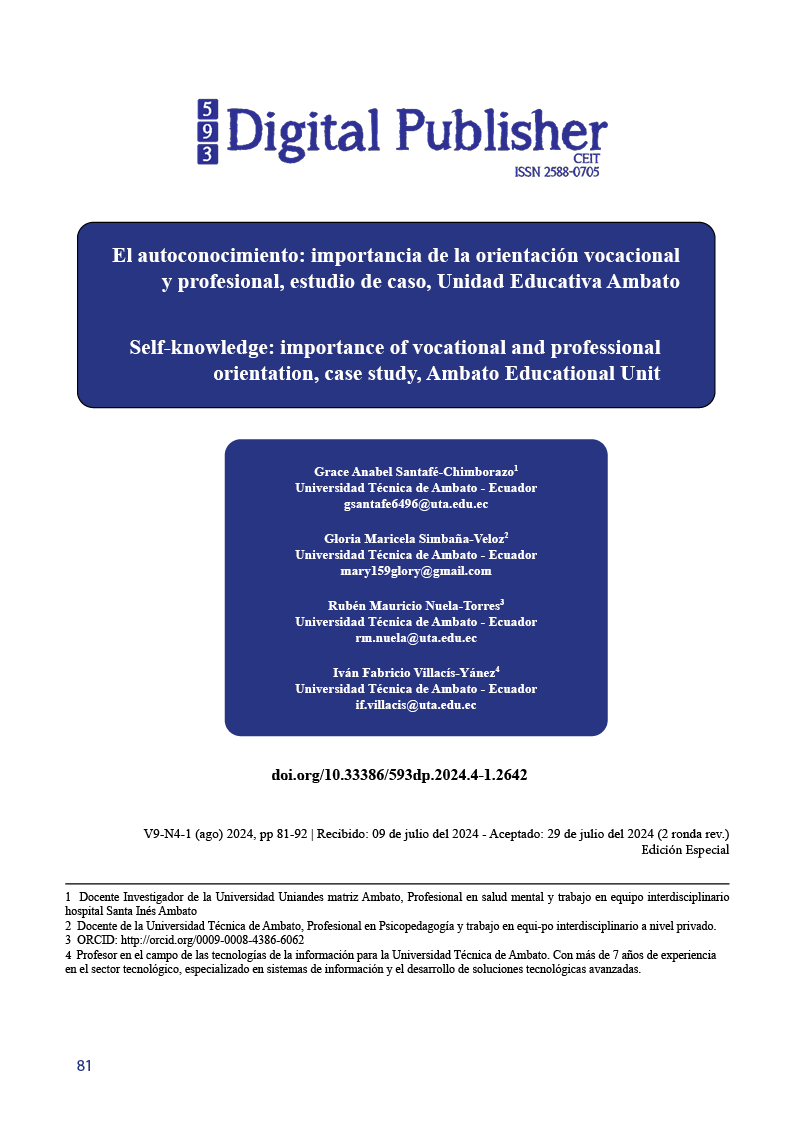Self-knowledge: the importance of vocational and career guidance
Main Article Content
Abstract
The present research deals with the analysis of self-knowledge and vocational and professional orientation for students between 15 and 16 years of age at the "Mario Cobo Barona" Educational Unit. The AF5 questionnaire by García Fernando was used, which has five dimensions: academic/labor, social, emotional, family and physical. Adolescence, an important stage in human development, is characterized by physical, emotional, and social transformations. As an essential part, self-concept has a significant impact on how adolescents perceive themselves and relate to their environment. This study emphasizes the role of self-concept in a person's balanced development and its impact on a variety of aspects, including academic and physical aspects. The non-experimental correlational cross-sectional study was conducted with 21 students from an educational unit in Ambato. The AF5 questionnaire, structured in five dimensions and with twenty questions, was used. An evaluation of the reliability and validity of the instrument was carried out in accordance with the specifications of the Ministry of Education. Informed parental consent and authorization from the educational institution preceded data collection. These results show that specific interventions are needed to strengthen the areas where students show deficiencies, particularly in the social and family dimensions, while maintaining and improving the areas where students already show good performance, such as in the physical area.
Downloads
Article Details

This work is licensed under a Creative Commons Attribution-NonCommercial-ShareAlike 4.0 International License.
1. Derechos de autor
Las obras que se publican en 593 Digital Publisher CEIT están sujetas a los siguientes términos:
1.1. 593 Digital Publisher CEIT, conserva los derechos patrimoniales (copyright) de las obras publicadas, favorece y permite la reutilización de las mismas bajo la licencia Licencia Creative Commons 4.0 de Reconocimiento-NoComercial-CompartirIgual 4.0, por lo cual se pueden copiar, usar, difundir, transmitir y exponer públicamente, siempre que:
1.1.a. Se cite la autoría y fuente original de su publicación (revista, editorial, URL).
1.1.b. No se usen para fines comerciales u onerosos.
1.1.c. Se mencione la existencia y especificaciones de esta licencia de uso.
References
Amado, A., Satan, N., Velasteguis, R., & Paúl, S. (2020). Organization and mangement in the prevention of occupational psychosocial risks in urban public transport. Revista Universidad y Sociedad, 12(4), 355-362. https://doi.org/https://doi.org/https://www.researchgate.net/publication/350018579
Antonova, M., Shukshina, T., Buyanova, I., & Neyasova, I. (s.f.). VOCATIONAL GUIDANCE OF JUNIOR SCHOOLCHILDREN ON PRACTICE-ORIENTED BASIS.
Cornella Font, M., & Juarez Lopez, J. (2020). Riesgo de adicción: su prevalencia en la adolescencia y su relación con la seguridad del apego y el autoconcepto. CLINICA Y SALUD. https://doi.org/10.5093/clysa2020a1
Fernández Guerrero, M., Hernández Merchán, F., Rodríguez Cayetano, A., & Pérez Muñoz, S. (2024). Asociación del acoso escolar y el autoconcepto físico en la transición de primaria a secundaria (Association of bullying and physical self-concept in the transition from primary to secondary). Scopus, 52. https://doi.org/ https://doi.org/10.47197/retos.v52.101130
Gómez , J., Sánchez Tarazaga, L., Sanahuja Ribés, A., & Martí Puig, M. (2023). Evaluación del autoconcepto y las habilidades sociales de docentes en formación. Revista Española de Orientación y Psicopedagogía, 34(1). https://doi.org/https://doi.org/10.5944/reop.vol.34.num.1.2023.37404
Hawley, E., & Mc Whirter, B. (s.f.). Critical Perspectives on Adolescent Vocational Guidance in Chile.
Herrera, E. (2021). Trends in the History of Vocational Guidance. Career development quarterly, 277-282.
Jhemy Quisjpe Aquise, Edwin Gusavo Estrada Araoz, Franklin Jara Rodriguez, & Pamela Barrionuevo Alosilla . (2024). Estudio del autoconcepto en una muestra de estudiantes de educación secundaria peruanos: un estudio transversal. Scopus. https://doi.org/ https://doi.org/10.56294/sctconf2024691
López Ruiz, D., & Bernal Caballero, M. (2023). Percepciones del autoconcepto en estudiantes de Educación Secundaria Obligatoria a través de la mediación artística. Revista Electronica Interuniversitaria de Formación del Profesorado, 26(3). https://doi.org/https://doi.org/10.6018/reifop.560861
Suría Martínez , R., Ortigosa Quiles, J. M., & Riquelme Marín, A. (2019). Perfiles de Inteligencia Emocional de Estudiantes Universitarios con Discapacidad Motora: Análisis Diferencial de las Dimensiones del Autoconcepto. REVISTA INTERNACIONAL DE INVESTIGACION AMBIENTAL Y SALUD PUBLICA, 16(20). https://doi.org/10.3390/ijerph16214073
Velastegui, R., Poler, R., & Días, M. (2023). Aplicación de algoritmos de aprendizaje automático a sistemas robóticos multiagente para la programación y control de operaciones productivas y logísticas: una revisión de la literatura reciente. Revista de Ingenieria de organización, 60-70. https://doi.org/https://doi.org/https://doi.org/10.37610/dyo.v0i80.643
Yañez Sepulveda, R., Gatica Simpson, E., Duclos Bastías, D., Cortés Roco, G., Hinojosa Torres, C., & Espinoza Oteíza, L. (2024). Nivel de autoconcepto físico en estudiantes universitarios según género (Level of physical self-concept in university students according to gender). Scopus, 51. https://doi.org/https://doi.org/10.47197/retos.v51.101019





